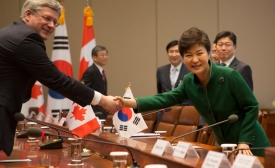canada
Ken Taylor, the former Canadian ambassador for Iran and centre of the so-called Canadian caper in 1979, gave a speech to the school’s graduating class at the Jubilee Auditorium last week. Born in Calgary, Taylor graduated from Crescent Heights in the 1950s. He played basketball and football for the school (“I wasn’t drafted,” he jokes) but yearned to travel the world. He got his wish, embarking on a globe-trotting career in the foreign service.

This article compares two middle powers, Canada and South Korea, to assess their changing role and relevance on the global stage.
Former Canadian Prime Minister Joe Clark urged Canada and Korea to bolster diplomacy in a world characterized by withering superpowers and sprouting middle powers. Canada’s 16th Prime Minister from 1979 to 1980 told a group of diplomats and scholars that as the international order is reconfigured around the world, nations increasingly rely on soft-power strategies of compromise, negotiation and development, rather than hard-power tactics of military aggression and bullying rhetoric.
In the hilltop village of Murehe, electricity is an exotic and faraway rumour. Like 97 per cent of the population in Burundi, one of the world’s poorest countries, the villagers here rely on candles and kerosene for a dim and flickering light. [...] What’s even more significant is how the village got its lamps. This wasn’t a traditional charity giveaway – the old-fashioned type of foreign aid. Instead, there was a business plan, technical innovation, a system of income generation with village enterprises and a partnership with a profit-making company.

Read the summary of the International Advocacy in the Digital Age workshop with recommendations from Canada, Israel, Mexico and the United States.
Plenty of diplomatic deals get done on the margins of global get-togethers, but one conducted on Twitter in 2014 made Prime Minister Stephen Harper a digital star among his fellow world leaders.(...) Most world leaders use the social media tool to broadcast specific messages; Harper is among many who don't generally reply when messages are sent their way.
The initiative announced on Tuesday will receive $300-million over the next five years. Proponents see the move as a good first step that could eventually put Canada in the ranks of other developed countries that are making a profit on loans and other financing options for Canadian, international and local businesses operating in developing countries.
Instead of bringing together love-starved singles, the project would introduce strangers with shared interest in development, including for-profit companies, non-profit organizations, governments and international agencies.







